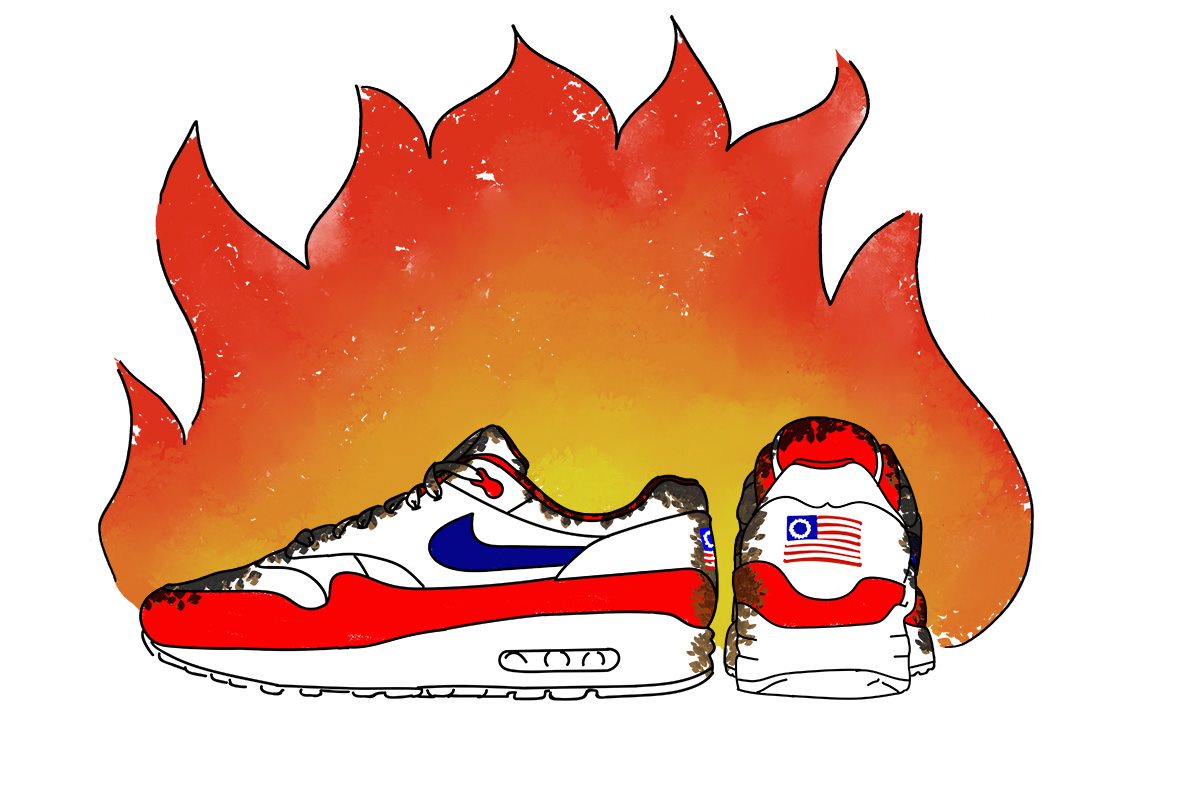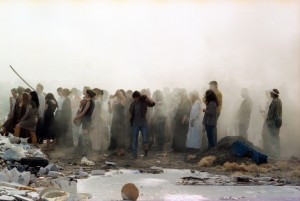
‘Independence’ Day
by Neil Natarajan | July 7, 2019
“What, to the American slave, is your Fourth of July? I answer: a day that reveals to him, more than all other days of the year, the gross injustice and cruelty to which he is a constant victim. To him, your celebration is a sham; your boasted liberty, an unholy license; your national greatness, swelling vanity; your sounds of rejoicing are empty and heartless; your denunciation of tyrants, brass fronted impudence; your shouts of liberty and equality, hollow mockery; your prayers and hymns, your sermons and thanksgivings, with all your religious parade and solemnity, are, to Him, mere bombast, fraud, deception, impiety, and hypocrisy—a thin veil to cover up crimes that would disgrace a nation of savages.” – Frederick Douglass
Nike recently pulled its new Nike Air Max 1 ‘Fourth of July’ from shelves. The sneaker would have displayed the original ‘Betsy Ross’ American flag, complete with thirteen stars and thirteen stripes, which signify the original thirteen colonies, across its heel. The shoe was met by criticism from activist and former NFL player Colin Kaepernick, known for his political activism against racism and for kneeling during the national anthem when it is played at American football games. In response to his comments that the flag symbolised a period of slavery and injustice, Nike decided not to release the trainers.
Doing so has invited a storm of responses on social media, from both proponents and opponents. Those against include Arizona state governor, Republican Doug Ducey, who even cancelled a $1 million fee-waiving incentive plan for Nike to expand within the state. He accused Nike of having “bowed to the to the current onslaught of political correctness and historical revisionism”.
Why is the Fourth of July such a controversial holiday? Why, only in recent times, has heated discussion occurred around its celebration? While answering the first question requires a national conversation, the answer to the second is simple: it hasn’t. Independence Day has been criticised for centuries. Abolitionist leader Frederick Douglass gave, on 5 July 1852, a speech condemning the holiday, entitled “What to the Slave Is the Fourth of July?”. Douglass decried the hypocrisy of the holiday and highlighted the reality that the ‘Independence’ in ‘Independence Day’, declared on 4 July 1776, applied only to a select few.
Perhaps unsurprisingly, Douglass’ words fell on deaf ears. Today, the Fourth of July celebrations rage across the map. Each year, fireworks representing gunfire from the revolutionary war light the night sky, and Americans celebrate the founding of America and everything that it stood for – to celebrate a day four score and seven years before America became the ‘home of the free’. To celebrate not the values America stands for today, but instead those declared ‘self-evident’ by a slave owner. Nowhere in these celebrations is there a recognition of how America has changed since its founding.
Should we tell a nation to not celebrate its birth? Should we destroy a tradition that has existed for centuries? Should we forget the American Revolution and the lofty ambitions that came with it?
Maybe. At the very least, we must admit that the American ‘Revolution’ wasn’t revolutionary, and that whatever talk of freedom and equality the founding fathers touted was just talk. The reality is that in 1776, “These United States of America” were hardly different from the Empire they sought to reject, and, perhaps most importantly, that none of these facts undermine what America stands for today. Instead of such admittance, this Fourth of July, The President sent a parade of tanks through the capital and gave a speech encouraging Americans to “remember our great history” and “stay true to our course”. In the first presidential Fourth of July speech since 1951, Trump’s event marks a shift in how the holiday is celebrated. This year, many gathered to brandish their MAGA hats, but many others protested against the event, or indeed the holiday itself. While the speech may have lacked his usual partisan rhetoric, it still served to divide the country on this Fourth of July.
Rhetoric surrounding ‘great history’ and enthusiastic displays of military might can serve to illuminate the difference between loving a country while acknowledging its flaws, and blind jingoism. Where the former spurs us on to tackle those issues, the latter has us denying their existence. As an American, I cannot honestly claim that my country is perfect. Since its birth, the ideal of America has been marred by a dangerous and deep-rooted racism. Instrumental in preventing the destruction of this racist system has been the steadfast belief that America is, and always has been, great. The unfortunate reality, however, is that even today, we often fail to uphold the ambitious goals of liberty and justice for all. I can still claim to love this country despite its flaws – but not because of them.
The problem in what the Fourth of July stands for doesn’t just stem from the flags or the fireworks, but from the fact that those who celebrate it are moving increasingly from patriotic affection to blinkered idolisation. In an age where the President’s celebration of ‘Independence Day’ actually includes a parade of tanks, perhaps what is called for is not a celebration of the nation’s past, but instead a discussion of the nation’s future. ∎
Words by Neil Natarajan. Illustration by Léa Gayer de Mena.




